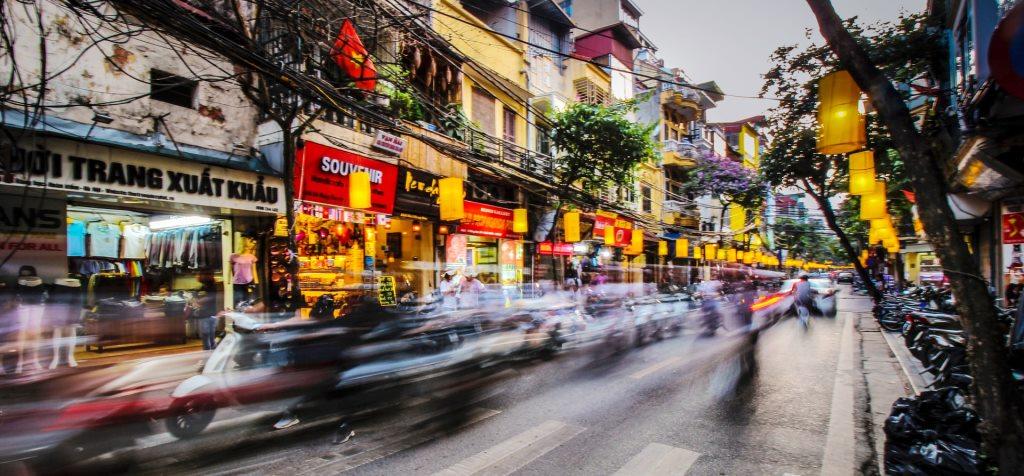In Hanoi, a city that is home to 7.7 million inhabitants, 5 million motorcycles flood the streets every single day.
This is a staggering number that Hanoi is investing to change. As a rapidly-growing capital and the second most populous city in Vietnam, Hanoi City is taking steps to address unprecedented levels of motorization and traffic that have led to polluted air, greenhouse gas emissions, and inefficient travel.
Although Hanoi City has invested in public transport infrastructure such as bus rapid transit (BRT), public transport accounts for only 10 percent of the total trips in the city. Motorcycles’ grip on the city is strong – they represent 80 percent of trips taken.
In order to improve air quality, reduce traffic jams and reach the city’s overall goal of creating a livable city, the deployment of sustainable last-mile solutions is critical. Hanoi City is turning to electric mobility solutions to increase the sustainability of the transport system.
With the aim to increase the ridership of public transport and effectiveness of the currently running BRT and the forthcoming metro rail, the city is partnering to deploy shared e-scooters to connect people from major BRT stations to important destinations such as shopping malls and residential areas. The e-scooters will be equipped with GPS positioning that supports eco-routing and generates data for assessment and further improvement.
This last-mile connectivity demonstration project is a part of Hanoi City’s work with SOLUTIONSplus, which brings together highly committed cities, industry, research, implementing organizations, and finance partners and establishes a global platform for shared, public, and commercial e-mobility solutions to kick start the transition towards low-carbon urban mobility.
Engaging with the stakeholders
The uptake of e-mobility requires ongoing institutional support and governance that engages a diversity of stakeholders. These stakeholders include not only the public authorities, such as local and national government representatives but also residents who use these systems – like pedestrians, cyclists, public transport users –as well as business and manufacturing representatives, service providers – like charging infrastructure operators and utility partners – and researchers.
Keeping this in mind, Hanoi City is investing in establishing close working relationships with many stakeholders to understand their needs, identify problems, and monitor and evaluate the project, in order to ensure a successful demonstration project.
Approaches to effective stakeholder engagement
Navigating and listening to all stakeholder groups is the largest challenge. A variety of measures, information packages, and marketing strategies will be established, including public meetings, websites, surveys, focus group discussions, and a series of communication campaigns.
Feedback and data will be gathered via surveys during workshops, meetings, and conferences. To gain insights into the performance of the system, the city will also develop an evaluation matrix to measure the effectiveness and efficiency of the outreach activities and the overall demonstration project.
Potential users in the demonstration area need to be informed about the benefits of e-mobility solutions to encourage them to opt for more sustainable modes of transport rather than private vehicles. Posters and flyers will be disseminated at the BRT stations and on the buses to raise awareness.
Related Articles: How Sustainable Transportation Drives Sustainable Cities | A Pathway to Sustainable Urban Freight
To ensure further buy-in from businesses, operators, and service providers, Hanoi City will also identify pathways for cooperation by establishing appropriate regulatory frameworks, financial incentives, along with training and toolkits to enhance the capacity of local stakeholders.
The integration of shared e-scooters with BRTs and metros requires route planning and smart ticketing, and an understanding of the functionality of existing applications for transport (e.g. Timbuyt for buses) is essential. Charging infrastructure development and battery solutions also need to be planned with the involvement of service providers.
The role of communication in ensuring a successful planning and implementation process
Planning for transportation is not limited to infrastructure and physical improvements and may not produce results overnight, but also includes the social issues that emerge from the residents, businesses, and other stakeholders.
Communication, advocacy, and promotion play a key role in strengthening partnerships and facilitating systematic change. Public engagement is a challenging task that requires resources, negotiations, and compromises, but it is pivotal to ensuring that potential environmental, social, and economic benefits of sustainable mobility projects come to fruition.
— —
This blog is based on the interview produced by the University of Transport and Technology in Hanoi, Vietnam, as part of the SOLUTIONSplus Global E-learning Programme
Editor’s Note: The opinions expressed here by Impakter.com columnists are their own, not those of Impakter.com. — In the Featured Photo: Des Moines, Iowa, U.S. — Featured Photo Credit: ICLEI.











